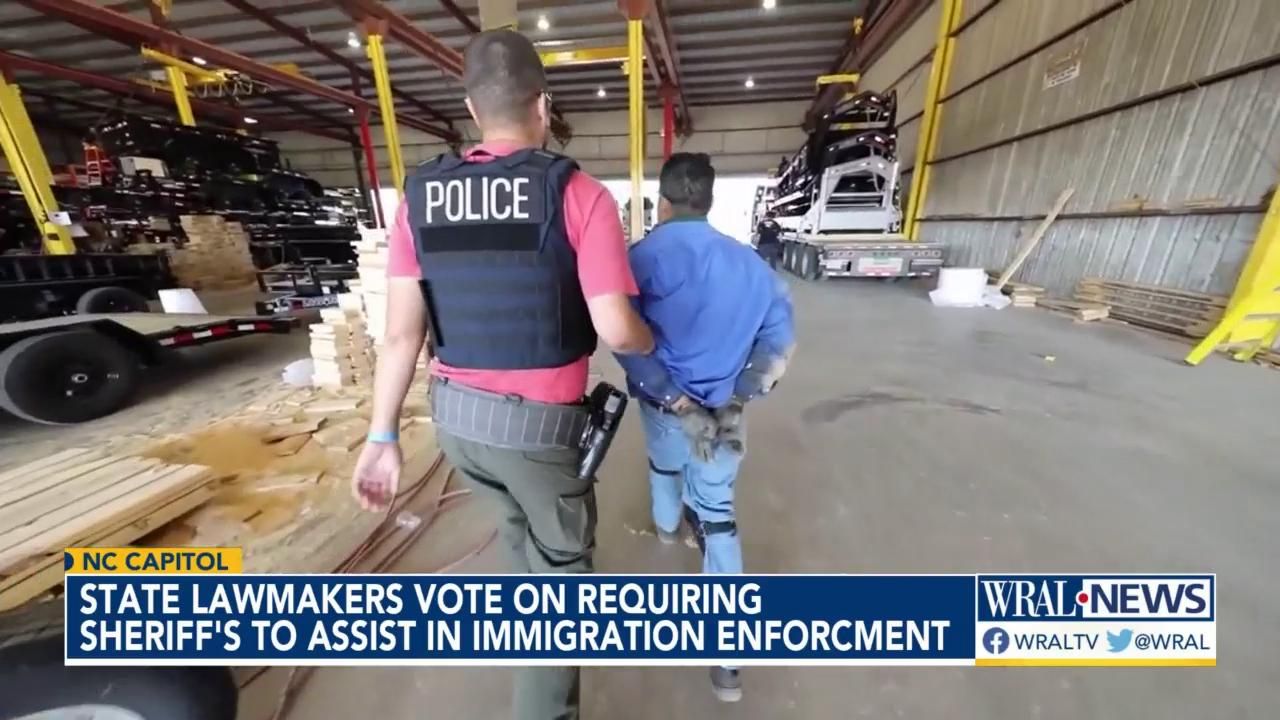NC Senate votes to force sheriffs to work with ICE, as immigration emerges as top political concern

A bill to require sheriffs to work with federal immigration officials passed the North Carolina Senate along party lines Thursday, as protesters looked on from the audience.
House Bill 10 passed 28-16, with Republicans in favor and Democrats opposed.
Democratic sheriffs in North Carolina's biggest urban counties have said it does more harm than good to public safety if they work with Immigration and Customs Enforcement agents. Local Hispanic residents are much less likely to report crimes, serve as witnesses or otherwise help local law enforcement if they know their local officials partner with ICE, multiple sheriffs, community activists and others have told state lawmakers.
The specific issue in question is what should happen when someone gets arrested but then released from the county jail — perhaps they posted bond or had their charges dismissed — but then ICE contacts the local sheriff to ask them to keep them behind bars despite the order to release them, citing a belief that they might be in the country illegally.
The bill would only require sheriffs to look up the immigration status of people charged with felonies or serious misdemeanors such as domestic violence. Republican Sen. Danny Britt, R-Robeson, said that's intended to protect undocumented immigrants who are pulled over while driving to work, for instance, and who could then be booked for driving without a license or some other traffic infraction.
Britt acknowledged that the agriculture and construction industries rely heavily on labor from immigrants, many of whom are not in the country legally, and that widespread deportations of those individuals would harm the state's economy.
"We're talking about violent criminals," Britt said of the bill's focus. "We're not talking about hard-working individuals."
Two previous versions of the controversial proposal were vetoed by Democratic Gov. Roy Cooper. Both times Republicans couldn’t muster the votes to override his veto. But Republicans now have a veto-proof supermajority, and the bill, House Bill 10, is likely to become law.
It passed the state House last year and now that it has passed the Senate must go back to the House for final approval before going to Cooper's desk, which is expected to occur quickly.
Democratic Sen. Mujtaba Mohammed, D-Mecklenburg, said the bill will harm public safety if it becomes law — and will likely also make it less likely for victims of violent crimes to get closure.
Mohammed worked for years as a public defender in Charlotte, and he said he never saw even one case where a defendant was taken by ICE but was later returned to local custody to actually stand trial for the crime they were accused of committing.
"What kind of dignity does that afford victims of violent crimes?" Mohammed asked in a speech on the Senate floor Thursday. "... This bill essentially allows defendants to leave the state of North Carolina without being prosecuted."
Republicans brushed aside Mohammed's criticism, saying they hadn't heard any similar concerns from the lobbying group that represents prosecutors.
Impact on elections, economy
The debate over the bill comes as polling shows immigration will likely be a heavy focus for GOP political campaigns in this year's elections for president, governor and other key positions.
In response to questions from WRAL earlier this week, Republican nominee for governor Mark Robinson said he "strongly supports" the bill and criticized Democratic President Joe Biden for his administration's immigration policies.
“North Carolina cannot be a sanctuary state for illegal immigrants,” Robinson said.
Robinson's main opponent for governor, Democratic nominee Josh Stein, declined to say what he thought of the bill. He instead issued a statement expressing more general support for law enforcement.
"If someone is convicted of a crime, especially a violent one, we will hold them accountable,” Stein said. “As the state’s top law enforcement officer, my focus is on solutions to keep people safe here in North Carolina."
A WRAL News poll in March found that Republican voters listed immigration as their most important issue. Most Democratic and independent voters also agreed that immigration from Central and South America should be slowed or completely stopped, the poll showed, even if they didn't assign it the same level of urgency as Republican voters did.
But those sorts of crackdowns could harm the state's economy, as Britt said Thursday. In 2020, according to U.S. Department of Agriculture estimates, two-thirds of all crop-farm workers in the United States were foreign-born. Most of them weren’t in the country legally.
The North Carolina Department of Commerce says immigration is — and will continue to be — necessary to keep the economy running, WRAL reported in March. The agency wrote a report concluding that because the state’s population is steadily getting older, and because Americans are having fewer children, “immigration will serve an increasingly critical role in supporting the labor force and bolstering North Carolina’s economic trajectory.”
A state commerce analysis of Census data shows immigrants and naturalized citizens in North Carolina are more likely to be employed or looking for work than native-born Americans, with 68.6% of the foreign-born population participating in the labor force compared with 59.8% of people born in America.














